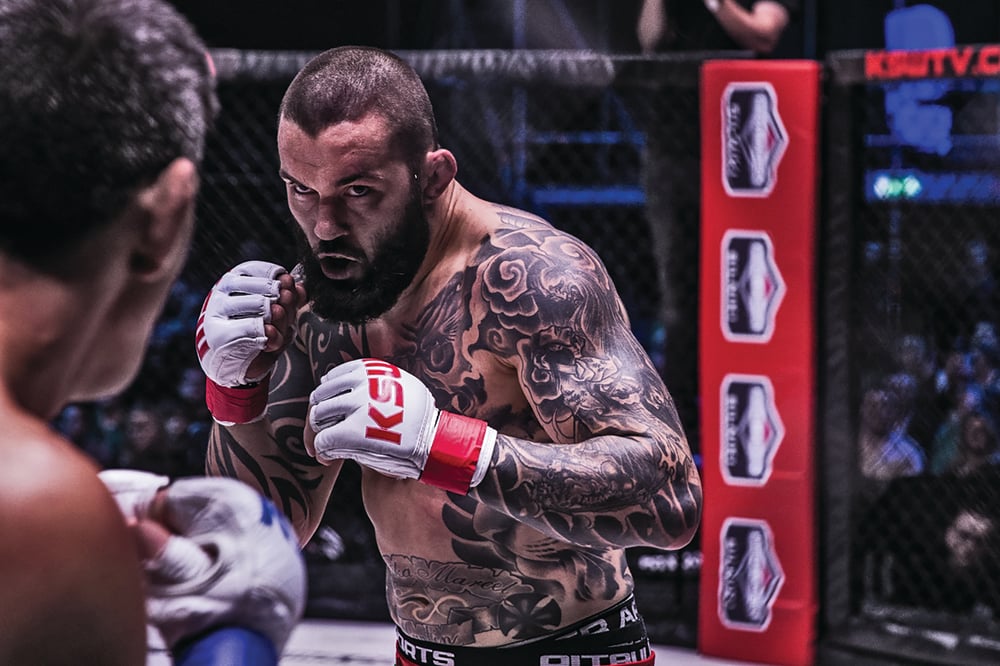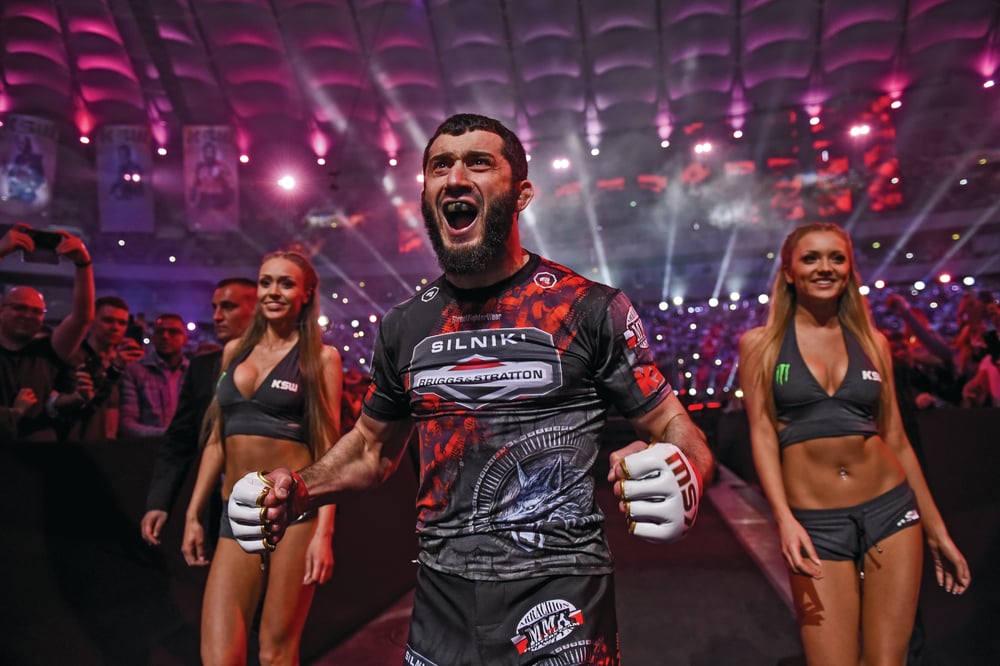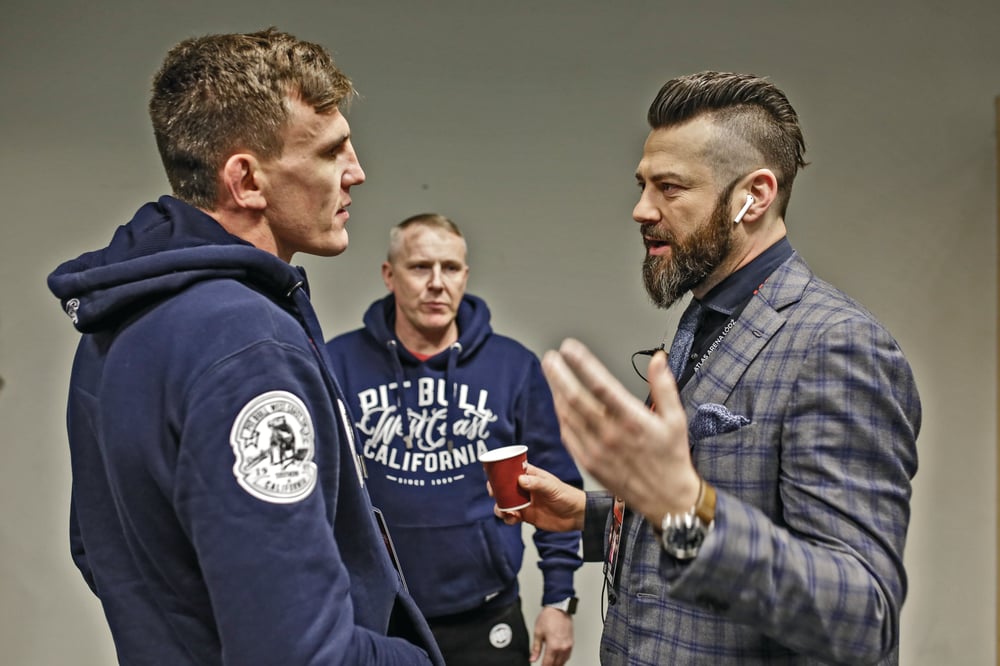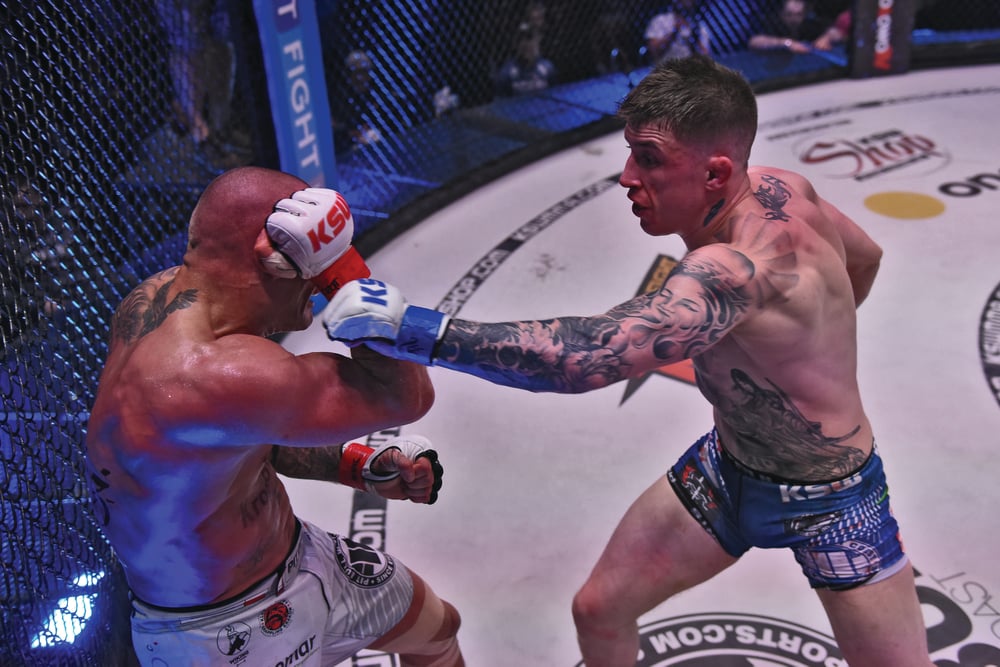
Issue 185
December 2019
From an idea in a hotel bar in the early 2000s, to selling over 57,000 tickets in Poland’s national stadium. KSW’s rise in Europe has been phenomenal, but according to co-founder Martin Lewandowski, they are just getting started.
Konfrontacja Sztuk Walki. These three words mean very little to MMA fans outside of Poland, but say the initials K-S-W and it will resonate with them a lot more. The Polish-based promotion is getting increasingly wider recognition outside of their homeland and after once again being nominated for the ‘Promotion of the Year’ award at the 2019 World MMA Awards, they are looking to step things up again heading into 2020.
KSW recently celebrated their 50th event in London on what was a momentous night for founders Martin Lewandowski and Maciej Kawulski. It marked 15 years since the first-ever KSW event took place in 2004 and featured three title fights on the line with the heavyweight, welterweight and interim lightweight title being contested.
It was ultimately a night that featured several good contests but ended disappointingly after a dour heavyweight contest between champion Phil De Fries and challenger Luis Henrique brought the evening to a dull climax.
Speaking after the event, Lewandowski admitted that the night didn’t go as planned, but that he was happy with the direction of the promotion was heading
“I thought it was a good show, but I’ll be honest, it wasn’t as good as I hoped it would be,” Lewandowski admitted. “I thought this might be the case during the lead-up to the event. There were so many things that were difficult: sales, publicity, promotions, fights falling through, injuries, the whole thing was hard. Of course, because it was KSW 50 I wanted more, but I think people were happy with what they saw on TV. On TV I think it looked better than at the venue.
“I think a lot of it was to do with the skills of the fighters,” he continued. “I think a lot of them were very evenly matched so some of the fights were a stalemate. Some of the fights were very good, but I think we can all agree the main event is best forgotten.
“These things happen sometimes and I never look at one show in isolation and judge the state of the company. A lot of things happen during the shows and you always reflect on them after and think that you should’ve done this or that. You can’t change the past though and these things are often out of your control.”

Lewandowski has been in the game long enough to know that things don’t always go to plan and it didn’t spoil a historic evening for him and his business partner Kawulski. KSW 50 was the latest milestone in an amazing journey that began back in Warsaw in the early 2000s when the pair first met and realized they shared a common love for martial arts.
“15 years ago we had our first show and I met Maciej [Kawulski] a year before that,” Lewandowski said. “We met through a common friend at an expo and after talking there we felt that we might do something. He came to the Marriott for lunch and we started talking, then I invited him for another lunch and we found some common ground. We both realized that we loved different martial arts. Maciej loved karate and I was a Kung Fu practitioner. We then started talking about how much we loved PRIDE; we weren’t fans of the UFC, but we loved PRIDE.
“The way they introduced their fighters, the way they celebrated fighters, the quality of the production was incredible,” he continued. “We were just fascinated by it. I can’t recall which of us really came up with the idea of KSW. I think it was just our two passions coming together and two guys who have the right skills to make a success. Maciej knew MMA people in Warsaw and I had a huge background in Marriott hotels where I was the promotions manager so we had the right mix of talents.”

After several meetings at Lewandowski’s office at the Marriott Hotel in Warsaw, the pair decided to hold their first event in February 2004. Like in many other countries around the world, the sport was in its very early stages of development and associated with all the wrong things. This only made a hard task even more difficult and money-paying sponsorship deals were impossible to come by.
“I think the idea of the name? I don’t know, I think it was mine, but it came up during a brainstorm so who truly knows,” Lewandowski said. “Neither Maciej or I can say it was fully our own idea. We came up with it at ‘Champions Restaurant’ at one of the tables which is still there. Right there and then we decided we would put on a show for like 300 people and it started to feel right away. I started to do as much media as possible and tried to get meetings with TV companies right away to try and get a deal.
“From the very first day media was very important for us,” he continued. “We managed to arrange TV and some sponsors, but they weren’t really sponsors because they were barter agreements. They didn’t want to invest any money because they were afraid of what the event was going to be and how it was going to look. MMA was associated with the worst things: illegal fights, dog fighting, criminals, mafia, and football hooligans. There was nothing to be proud of so it made it hard to go to sponsors and say ‘put your money on the table.’
“Maciej and I must’ve spent hundreds, no thousands, of hours in my office at the Marriott calling potential sponsors and trying to convince them to invest. It was horrible. People didn’t want to listen and they didn’t want to pick up the phone to us. Just to meet them in person was a huge success. To break all the stereotypes surrounding the sport was the biggest hurdle we had to overcome. It was very hard to begin with, but every show gave us something.”

In 2006 things started to become a lot more real as Lewandowski and Kawulski took the gamble of hosting events outside of the Marriott venues. It was a decision they took with risk, but it ultimately led to KSW being brought to a wider audience in Poland and proved to be the catalyst of a remarkable year in 2009.
“The first big sponsors we got were for KSW 4 and 5,” Lewandowski said. “It was very small money, but it was a huge difference to having nothing. It was a massive breakthrough. At KSW 6 we moved to a bigger venue and out of the hotel spaces to an actual real venue. We only used half of it, but again that was a big moment for us.
“After that, I feel I feel like the next big moment for us was Mamed Khalidov’s first fight for an international belt against Daniel Acacio at KSW 11,” he continued. “It was a fight covered by every sports outlet in the country. It was like the sports industry had truly recognized us. They saw we were holding events with regulations, medical staff, and with a high amount of organization.
“Later that year we had Mariusz Pudzianowski make his KSW debut,” he added. “That’s when I really think we started seeing commercial success. That day was incredible; it was like everybody in Poland was talking about it. Everybody from teenagers to grandparents, everybody was talking about his MMA debut. That’s when the sponsors really started coming in and they realized that advertising on our show was a good idea.”
Lewandowski openly admits that without Pudzianowski, Khalidov and an early TV deal with the country’s national sports channel Polsat that KSW would’ve struggled to get off the ground. With these breakthroughs, Lewandowski and Kawulski knew that for continued success they had to be different to other MMA promotion and it was their initial love of PRIDE that helped them deliver exactly that.
“We always knew it needed to look good and be an experience like none other,” Lewandowski said. “We wanted people to be entertained from the opening of the show to the very last fight. We wanted it to be like a move that you watch from beginning to end. I don’t think you get that at other shows and that’s what I think makes us stand out.
“How we present the product on TV is very different,” he continued. “Everything from the graphics, the trailers, the promotions, the camera angles, everything is thought through and I think it makes it very unique and special.”
It’s been a recipe that has seen KSW grow to be one of the biggest promotions worldwide and by most metrics more popular than the UFC in its native land. The biggest night in the promotion’s history came on May 27, 2017, when KSW: Colosseum took place at Poland’s national stadium, The PGE Narodowy.
57,776 tickets were sold making it the second-highest attended event in MMA history and undoubtedly the biggest night in the history of KSW.
“There have been a lot of massive moments in our history, but KSW Colosseum stands out for me,” Lewandowski said. “It was the second-biggest ever MMA show. The whole half of a year out from when we announced it was just insane. I promised I would let myself enjoy the evening and I really did. That whole thing was very unique.
“I remember gazing around at all the fans that night and taking their energy. Just remembering how small KSW once was and then that night filling a stadium full of fans. It was insane and a very proud moment for the company.”

Two years now down the line from the first Colosseum event, Lewandowski revealed that the next won’t be too far off. Although plans to hold a stadium show next year have been scuppered by another major sporting event in the Polish capital, the KSW boss is confident that come 2021 they will once again be back in the PGE Narodowy.
“Colosseum II will happen and it will be sooner rather than later,” Lewandowski revealed. “It won’t be next year [2020] because there are the European Championship soccer matches. I don’t think it would be wise to try and compete with that and I don’t want to force people to have to choose between watching the football or coming to our show. It would just be too risky. We will be back though. Colosseum II is going to be incredible.”
Lewandowski will be hoping that come Colosseum II his biggest star Khalidov will still be fighting. The Pole briefly retired last year following two losses to KSW light heavyweight champion Tomasz Narkun, but at KSW 50 it was announced that he would return to the cage later this year at KSW 52. Lewandowski believes his decision to retire was made to hastily and that Khalidov is deserving of a much grander celebration when he decides to hang up the 4-oz. gloves.
“From my perspective, Mamed retried too early and I think he made the decision too quickly,” Lewandowski said. “That day wasn’t the time to retire and two hours after the fight we met for a small supper and I told him that. I explained to him that the two fights with Narkun were very close and that going up in weight was just an experiment. There are weight classes for a reason. The first fight he nearly won and in the second fight, it was again very close.
“He wasn’t dominated in either of the fights and had that been the case maybe I would’ve thought it was time to retire and that his was time was up,” he continued. “He wasn’t though and I also think it would’ve been such a shame for him to retire without having a special show to mark the end of an era. I think he then started thinking about it and that the time wasn’t right.”

Lewandowski went on to reveal that the idea of retirement isn’t the only thing that the Polish legend has been battling with lately. Whether or not Khalidov’s battle with KSW middleweight champion Scott Askham in December will be his last remains, but it’s clear his future is dependent not only on his physical state but also his mental well-being.
“Mamed has been suffering from depression,” Lewandowski said. “That was something also weighing heavily on him at the time. Now, he seems to be coping with it better, but he will probably have to deal with it for the rest of his life. Right now he is ok, but if he wasn’t I would never ask him to fight or return to the cage. He feels much better though.
“We are not announcing this as Mamed’s last fight,” he continued. “Maybe it will be, maybe it won’t. He doesn’t know if he’s going to fight more than that and neither do we. I would love Mamed to fight at least once a year for a few more years. It’s always so unique and special when Mamed fights. We need to just let him take care of his business though.”
In recent years KSW has seen a significant amount of fighters outside of Poland come into the organization and win titles. With the likes of Norman Parke, Saldine Parnasse, Roberto Soldic, Askham, and De Fries all currently holding KSW gold, the only Polish champion currently in the organization is Tomasz Narkun. Lewandowski believes it’s a sign of the promotion developing into a truly international organization and that having champions from all over the world helps with the globalization of the brand.
“From day one we’ve never had all Polish fighters,” Lewandowski said. “We used to have less money to fly people in, but we always had fighters coming from Easter borders like Russia and Belarus, but by KSW 6 or 7 we had fighters from Brazil and Japan. We treated ourselves like an international promotion since day one, but our budget didn’t stretch as far as it does now.
“We are now starting to branch out to different countries and I think this is a key to us being more recognizable in different regions,” he continued. “When we open wider to European countries we begin to invite more foreign fighters so it comes as no surprise that they start taking the belts. We only have one Polish champion right now, but I’m ok with that. I think it’s great to have champions like Roberto Soldic who can help us open up a market like Croatia. They love him there and that’s encouraged us to put on an event there later this year.”

Having staged shows in Poland, Ireland, England, and soon Croatia, Lewandowski says KSW won’t be stopping there. With the sport growing in popularity all over the world the KSW co-founder believes they have options all over Europe though he admits it’s getting harder in some territories given the increasing amount of regulation.
“I want to go back to Ireland but it’s very difficult to go there and I think they have taken things too far with all the regulations,” Lewandowski said. “It’s not an easy place to do a show, but I’ve recently spoken to people there and I’m hopeful we can sort things out. When we go there a lot of industries grow. Hotels, shops, taxis, venues, fighters, they all benefit.
“Ireland isn’t the only country though, I am thinking very strongly about Germany,” Lewandowski continued. “We also want to go back to England every year, German is also on our list, and maybe possibly Sweden. It’s also difficult to do things in Sweden because of the regulations, but to do an event there would be great. Our first event in Croatia will take place in November and I believe it’s going to be a great success so I believe we will be back next year. The only other country I’m thinking about at the moment is Italy where we are seeing a lot of growth in the sport.”
KSW won’t just be stopping at Europe though. Lewandowski has recently spoken out about the possibility of a KSW event being held in the US and it’s something that he is hoping will come to fruition next year. Whilst the KSW boss is always keen to distance the brand from being solely for a Polish audience, Lewandowski was keen to stress that when they head to the US the show will be designed to cater for the Polish ex-pat community.
“The US is the country of the UFC and Bellator, but we will go there just for the Polish community,” Lewandowski said. “For all the other new territories we go there to be attractive for the country in which we are going to, not specifically Poles. In the US it will be different though. It will be more like a concert for Polish people only.”
One possibility Lewandowski has never ruled out is a co-promoted event with Bellator MMA. With Scot Coker recently doing business with RIZIN FC and cross-promoting fights featuring Darrion Caldwell and Kyoji Horiguchi, it’s not unrealistic to think that a similar deal could be struck with KSW.
Lewandowski admitted he’s already been on the phone to Coker about working collaboratively, but as of yet a deal is yet to be struck.
“We tried to do some cross-promotion recently and we sent them an offer for some of the stuff in London,” Lewandowski said. “I wanted to do Soldic against Paul Daley, but we didn’t get to an agreement. This is a topic I’m interested in though, but it’s a negotiation and a process. I would love to exchange fighters and do cross-promotion with them, but I can’t tell if or when it will happen.
“I’ve met Scott [Coker] many times all over the world and we have a good and long history. We help each other, but there’s nothing official. I’m hopeful in the future we can work together. I think it would be good for both KSW and Bellator.”
With another stadium show, event in new territories and possible co-promotions all in the reckoning, it’s understandable why Lewandowski says “there are many exciting things to come” in the near future for KSW.
...











